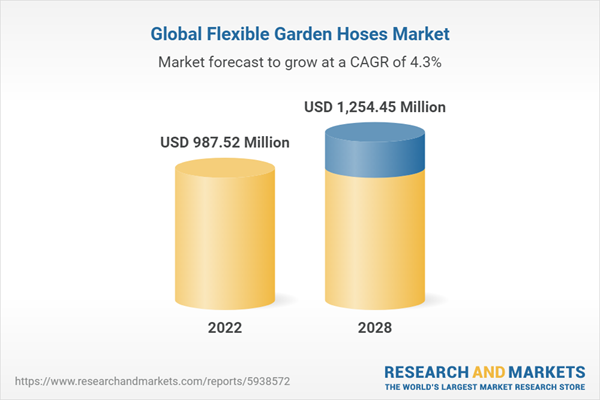Dublin, March 15, 2024 (GLOBE NEWSWIRE) -- The "Flexible Garden Hoses Market - Global Industry Size, Share, Trends, Opportunity, & Forecast 2018-2028" report has been added to ResearchAndMarkets.com's offering.
The Global Flexible Garden Hoses Market was valued at USD987.52 million in 2022 and is anticipated to project robust growth in the forecast period with a CAGR of 4.25% through 2028, reaching USD 1254.45 million. 
Key Market Drivers
The Evolution of Flexible Garden Hoses
Flexible garden hoses have come a long way since their inception. Initially, these hoses were often bulky, prone to kinking, and made of materials like rubber or vinyl, which were not particularly durable. However, innovation in materials and design has transformed these hoses into highly functional and versatile tools for gardening and outdoor use.
One of the most notable innovations in materials is the use of advanced polymers and hybrid materials. Manufacturers have turned to materials like polyurethane and thermoplastic elastomers (TPE) to create garden hoses that are not only lightweight but also incredibly durable. These materials are resistant to kinking, cracking, and UV damage, making them ideal for long-term outdoor use.
Moreover, the design of flexible garden hoses has also seen significant advancements. Traditional hoses were typically rigid and challenging to maneuver around obstacles. Modern hoses incorporate features like expandable designs, which allow them to stretch and contract as needed. This innovation not only makes storage easier but also reduces the risk of tripping hazards in the garden.
In addition to flexibility, ergonomic design has played a crucial role in enhancing the user experience. Many hoses now feature comfortable grips, swivel connectors, and easy-to-use nozzles, making watering and other tasks more convenient and less physically taxing.
Sustainability and Eco-Friendly Materials
Another major driver in the Flexible Garden Hoses Market is the growing demand for sustainability and eco-friendly materials. With increasing awareness of environmental concerns, consumers are actively seeking products that have a lower impact on the planet. Manufacturers have responded by developing hoses made from recyclable and eco-friendly materials.
One significant innovation is the use of recycled materials in hose manufacturing. Some companies are using post-consumer recycled plastics to create the outer casing of garden hoses. This not only reduces plastic waste but also conserves resources and energy compared to using entirely new materials. Additionally, these hoses are often recyclable at the end of their lifespan, promoting a circular economy.
Furthermore, there is a trend towards hoses that are free from harmful chemicals like lead, phthalates, and BPA. These chemicals can leach into the water and soil, posing risks to plants, pets, and humans. The development of hoses that are certified as safe for potable water and free from such contaminants has gained traction in the market.
Moreover, some manufacturers are exploring biodegradable materials for hose construction. While this is still a developing area, the prospect of hoses that can break down naturally over time without harming the environment is promising. These innovations align with consumers' growing concerns about reducing their ecological footprint and making sustainable choices in their gardening practices.
Smart Technology Integration
Innovation in materials and design isn't limited to the physical aspects of flexible garden hoses. The integration of smart technology has become a significant driver in the market. Gardeners and homeowners are increasingly looking for hoses that offer automation and convenience.
Smart hoses can be controlled via smartphone apps, allowing users to remotely turn the water on and off, set watering schedules, and monitor water usage. This not only saves time and effort but also helps conserve water, an important consideration in regions facing water scarcity.
Furthermore, some smart hoses come equipped with sensors that can detect soil moisture levels and weather conditions. This data is used to optimize watering schedules, ensuring that plants receive the right amount of water at the right time. This technology is particularly appealing to avid gardeners who want to maximize plant health while minimizing water waste.
Innovation in smart technology also extends to hose accessories. Manufacturers have developed wireless water timers and flow meters that can be easily added to existing hoses, transforming them into intelligent watering systems. These devices enable precise control over irrigation, reducing water wastage and promoting efficient gardening practices.
For more information about this report visit https://www.researchandmarkets.com/r/hcgmtd
About ResearchAndMarkets.com
ResearchAndMarkets.com is the world's leading source for international market research reports and market data. We provide you with the latest data on international and regional markets, key industries, the top companies, new products and the latest trends.
Attachment
